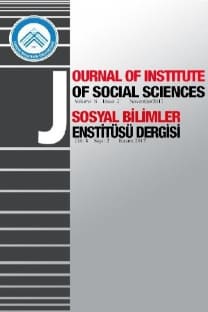İlköğretim Okullarındaki Özengen Müzik Eğitiminin Öğrencilerin Müziksel Davranışlarına Yansıması
Bu araştırmada, ilköğretim okullarında genel müzik eğitimini destekleyici nitelikte verilen, özengen müzik eğitiminin, öğrencilerin müziksel kişilik kazanma, müzik dinleme, müziksel bilgilenme, müziksel işitme-okuma-yazma, müziksel iletişim ve etkileşimde bulunma eğitimlerine etkileri incelenmiş ve araştırılmıştır. Araştırmadaki veriler kaynak tarama ve anket yöntemiyle elde edilmiştir. Çalışmanın amacına uygun olarak çizelgeler hazırlanmış, elde edilen bulguların istatistiksel analizi yapılarak “yüzde ve frekans” hesaplamaları yorumlanmıştır. Araştırmanın evrenini, Ankara Özel Bilim ilköğretim okulunda özengen müzik eğitimi kurslarına katılan öğrenciler ve velileri oluşturmaktadır.Araştırmanın çalışma gurubunu, Ankara Özel Bilim ilköğretim okulunda özengen müzik eğitimi çerçevesinde oluşturulan keman/piyano kurslarına katılan 30 öğrenci ve velileri oluşturmaktadır. Araştırmanın sonucunda özengen müzik eğitimi alan öğrencilerin müziksel davranışlarındaki değişmeler tespit edilerek alana yarar sağlayacağı düşünülen öneriler geliştirilmiştir.
The Reflection of the Amateur Music Education in Primary Schools to the Musical Behaviours of the Students
In this study the influences of the amateur music education which is provided in support of the general music education in primary schools to the students’ education on acquiring a musical character and knowledge, listening to music, musical hearing-reading and writing education, having musical communication and interaction have been examined and researched. The data of the research has been obtained through the literature review and questionnaire methods. The tables were prepared in line with the aim of the study, and the findings have been statistically analysed and the "frequency and percentage" calculations have been interpreted. The population of the research consists of the students who have attended amateur music education courses at the Ankara Private Bilim elementary school and their parents. The working group of the research consists of 30 students who have attended violin/piano courses at the Ankara Private Bilim elementary school and their parents. As a result of the study, the changes in the musical attitudes of the students who attain amateur music courses have been established, and suggestions which are thought to provide useful in this field have been developed.
___
- Balcı, A. (2005). Sosyal Bilimlerde Araştırma. Ankara: Pegem A Yayıncılık.
- Cross, I. (2001). Music, Cognition, Culture, and Evolution. Annals of the New York Academy Sciences, 22(3): 28-42
- Denac, O. (2008). A Case Study of Preschool Children‟s Musical Interests at Home and School. Early Childhood Education Journal, 35: 439- 444.
- Ekiz, D. (2003). Eğitimde Araştırma Yöntem ve Yöntemlerine Giriş. Ankara: Anı Yayıncılık.
- Göğüş, G. (2008). Müziksel ve Matematiksel Öğrenme Başarısı Arasındaki İlişki. Uludağ Üniversitesi Eğitim Fakültesi Dergisi XXI(1): 79-89.
- Özdemir, G., Yıldız, G. (2010). Genel Gelişim Sürecinde Müziksel Gelişim. Mehmet Akif Ersoy Üniversitesi Sosyal Bilimler Enstitüsü Dergisi, 2: 80-94.
- Paguette, K.R., Rieg, S.A. (2008). Using Music to Support the Literacy Development of Young English Language Learners. Early Chilhood Education Journal, 36: 227-232.
- Synder, S. (1997). Developing Musical Intelligence: Why and How? Early Childhood Education Journal, 24(3): 165-171.
- Uçan, A. (1997). Müzik Eğitiminde Temel Kavramlar-İlkeler-Yaklaşımlar. Ankara: Müzik Ansiklopedisi Yayınları. 14-16-31-32-34.
- Yeşilyaprak, B. (2003). Gelişim ve Öğrenme Psikolojisi. Ankara: Pegem A Yayıncılık. 61-62.
- Yıldız, E., Şen, Y. ( 1999 ). Küçük Yaşlarda Müzik ve Piyano Eğitiminin Önemi. A.Ü. Güzel Sanatlar Enstitüsü Dergisi, 5: 187-191.
- ISSN: 1309-3738
- Yayın Aralığı: Yılda 2 Sayı
- Başlangıç: 2010
- Yayıncı: Prof. Dr. Coşkun POLAT
Sayıdaki Diğer Makaleler
Şaman Davulu Dinlemenin Ruhsal Duruma Etkisi
Ali Maruf ALASKAN, Ayşegül BİLGE, Çağnur ŞARMAN
Haber: “Tarihî Metinlerin Yayımı Meselesi” Konulu İç Anadolu Bölgesi Dilcileri Sürekli Çalıştayı I
Sağlık Hizmeti Sistemlerinin Etkinliği: Bir Kamu Hastanesi ve Özel Hastane Karşılaştırması
Serap ÇABUK, Hatice DOĞAN SÜDAŞ, Deniz ZEREN
Duygusal ve Rasyonel Sosyal Reklam Mesajlarının Etkililiği Üzerine Bir Araştırma
Tanzimat Dönemi Kamu Politikalarında Bir Aktör Olarak Bürokrasi
KOBİ’lerin Kredi Değerliliğinin Ölçümünde Ortaya Çıkan Sorunlar: Çözüme Yönelik Bir Uygulama Örneği
Türkiyedeki Vakıf Üniversitelerinin Eğitim Faaliyetlerinin Mevcut Durumunun Araştırılması
‘Bozkırdaki Su’ Ceyhun Atuf Kansu
